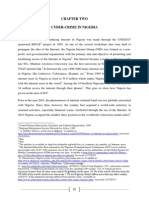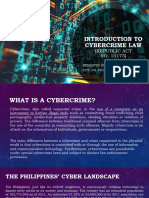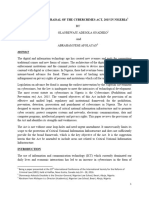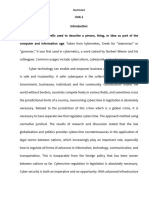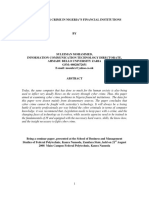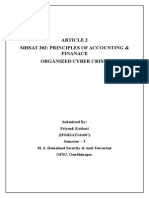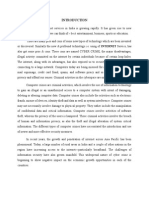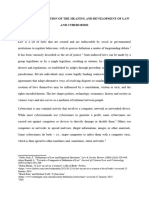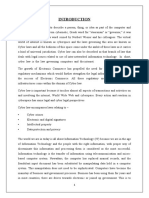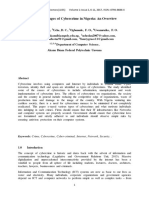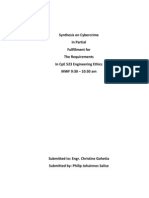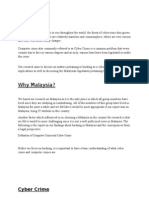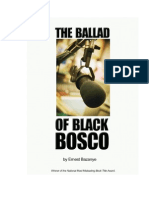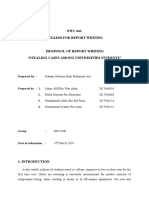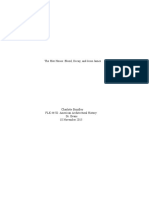0 ratings0% found this document useful (0 votes)
127 viewsEhimen O.R., Bola A. - Cybercrime in Nigeria
Ehimen O.R., Bola A. - Cybercrime in Nigeria
Uploaded by
zeebonThis document summarizes a research paper on cybercrime in Nigeria. The paper investigates cybercrimes occurring in Nigeria and the relevant laws to combat them. Cybercrimes investigated include online scams ("yahoo boys") that defraud victims through impersonation and false promises. Existing Nigerian laws like the Economic and Financial Crimes Commission Act and Criminal Code can prosecute cybercrimes but were not designed for the internet. The paper examines solutions to strengthen laws and law enforcement to curb the growing issue of cybercrime in Nigeria.
Copyright:
Attribution Non-Commercial (BY-NC)
Available Formats
Download as DOCX, PDF, TXT or read online from Scribd
Ehimen O.R., Bola A. - Cybercrime in Nigeria
Ehimen O.R., Bola A. - Cybercrime in Nigeria
Uploaded by
zeebon0 ratings0% found this document useful (0 votes)
127 views10 pagesThis document summarizes a research paper on cybercrime in Nigeria. The paper investigates cybercrimes occurring in Nigeria and the relevant laws to combat them. Cybercrimes investigated include online scams ("yahoo boys") that defraud victims through impersonation and false promises. Existing Nigerian laws like the Economic and Financial Crimes Commission Act and Criminal Code can prosecute cybercrimes but were not designed for the internet. The paper examines solutions to strengthen laws and law enforcement to curb the growing issue of cybercrime in Nigeria.
Original Description:
Original Title
CYBER CRIME
Copyright
© Attribution Non-Commercial (BY-NC)
Available Formats
DOCX, PDF, TXT or read online from Scribd
Share this document
Did you find this document useful?
Is this content inappropriate?
This document summarizes a research paper on cybercrime in Nigeria. The paper investigates cybercrimes occurring in Nigeria and the relevant laws to combat them. Cybercrimes investigated include online scams ("yahoo boys") that defraud victims through impersonation and false promises. Existing Nigerian laws like the Economic and Financial Crimes Commission Act and Criminal Code can prosecute cybercrimes but were not designed for the internet. The paper examines solutions to strengthen laws and law enforcement to curb the growing issue of cybercrime in Nigeria.
Copyright:
Attribution Non-Commercial (BY-NC)
Available Formats
Download as DOCX, PDF, TXT or read online from Scribd
Download as docx, pdf, or txt
0 ratings0% found this document useful (0 votes)
127 views10 pagesEhimen O.R., Bola A. - Cybercrime in Nigeria
Ehimen O.R., Bola A. - Cybercrime in Nigeria
Uploaded by
zeebonThis document summarizes a research paper on cybercrime in Nigeria. The paper investigates cybercrimes occurring in Nigeria and the relevant laws to combat them. Cybercrimes investigated include online scams ("yahoo boys") that defraud victims through impersonation and false promises. Existing Nigerian laws like the Economic and Financial Crimes Commission Act and Criminal Code can prosecute cybercrimes but were not designed for the internet. The paper examines solutions to strengthen laws and law enforcement to curb the growing issue of cybercrime in Nigeria.
Copyright:
Attribution Non-Commercial (BY-NC)
Available Formats
Download as DOCX, PDF, TXT or read online from Scribd
Download as docx, pdf, or txt
You are on page 1of 10
2009 93
Ehimen O.R., Bola A. - Cybercrime in Nigeria
Okonigene Robert Ehimen, Adekanle Bola
CYBERCRIME IN NIGERIA
Okonigene Robert Ehimen, Adekanle Bola
Abstract
In this paper we investigated cybercrime and examined the relevant laws available to combat this
crime
in Nigeria. Therefore, we had a critical review of criminal laws in Nigeria and also computer
network
and internet security. The internet as an instrument to aid crime ranges from business espionage,
to banking fraud, obtaining un-authorized and sabotaging data in computer networks of some key
organizations. We investigated these crimes and noted some useful observations. From our
observations,
we profound solution to the inadequacies of existing enabling laws. Prevention of cybercrime
requires
the co-operation of all the citizens and not necessarily the police alone who presently lack
specialists
in its investigating units to deal with cybercrime. The eradication of this crime is crucial in view
of the
devastating effect on the image of Nigeria and the attendant consequence on the economy. Out of
over
140 million Nigerians less than 5x10-4% are involved in cybercrime across Nigeria.
Business Intelligence Journal - January, 2010 Vol.3 No.1
94 Business Intelligence Journal January
Introduction
Computer crime can broadly be defined
as criminal activity involving an information
technology infrastructure: including illegal
access or unauthorized access; illegal
interception that involves technical means
of non-public transmissions of computer
data to, from or within a computer system;
data interference that include unauthorized
damaging, deletion, deterioration, alteration
or suppression of computer data; systems
interference that is interfering with the
functioning of a computer system by
inputting, transmitting, damaging, deleting,
deteriorating, altering or suppressing
computer data; misuse of devices, forgery
(ID theft), and electronic fraud [1]. The
advent of digital technology gave birth to
modern communication hard-wares, internet
service and powerful computer systems to
process data [2]. Hence, cyberspace has
provided a save haven for internet platform,
which has created geometric growth and
accelerated windows of opportunities for
businesses and the removal of economic
barriers hitherto faced by nations of the
world. People from diverse areas of human
endeavour can now freely access and
utilize the advantages offered by internet
platform. However, information technology
revolution associated with the internet in
Nigeria has brought about a new wave of
crime. A very few criminally minded youth
in the country, who are mostly not educated
or graduates, are stealing and committing
atrocity through the aid of the internet online
business transactions. The internet online
business services, which ordinarily suppose
to be a blessing as it exposes one to a lot of
opportunities in various field of life is fast
becoming a source of discomfort and worry
due to the atrocity being perpetrated through
it. Cybercrime has come as a surprise and a
strange phenomenon that for now live with
us in Nigeria. Computer crimes encompass
a broad range of potentially illegal
activities. Generally it may be categorize
into two major groups: (1) crimes that target
computer networks or devices directly; (2)
crimes facilitated by computer networks
or devices, the primary target of which is
independent of the computer network or
device [3-9]. Nigeria was recently identified
as the innocent and ignorant passive player
in cyberspace knowledge Olympiad [10].
The capture of Al Qaeda’s operative,
Muhammad Naeem Noor Khan, provided
the Pakistani and American Intelligence
Authority with some of Al Qaeda’s Internet
Communication Strategy. It also identified
that Nigerian Websites and Email System
were used by Al Qaeda to disseminate
internet information. This has once again
brought up the pertinent questions of the
safety and security of Nigeria’s national
cyberspace. This paper therefore addresses,
from our investigation the aspect that deals
with cybercrime based on false pretence or
impersonation.
An area that is likely to be fertile to the
cyber criminals also called “yahoo boys”
is the stock exchange market. Proper
mechanism needs to be put in place to
control the activities of these criminals in
this area otherwise Nigeria economy may be
brought down, particularly with trading on
the country’s stock exchange market going
online. Without proper security methods
in place, it is just like building a house
without locks. Any person can gain access.
The category and nature of cybercrime in
Nigeria is endless. Cybercrime is a global
phenomenal that is threatening the economy
of nations. It is a major threat in India as it
is in Nigeria. Punjab National Bank suffered
a loss of close to Rs. 1. 39 chore when the
computer recorders were manipulated to
create false debits and credits. In bank of
Baroda, Rs 2.5 lakh was misappropriated
2009 95
through the computerized creation of false
bank accounts [11]. In Mahanager Telephone
Nigam Limited (MTNL) in Delhi, a junior
telecom official was charged for reversing
electronic telephone meter system thereby
allowing some commercials export houses
to make overseas calls without the charges
being directed to their telephone numbers.
Materials and Methods
We investigated and carried out a
critical review of criminal laws in Nigeria.
Also an investigation was carried out
on cybercrimes, the social economical
consequences, the damage or negative
impact it had on the image of Nigeria as a
nation. We examined the inadequacies of the
existing laws in combating cybercrime and
profound solution.
Cybercrime
Technology has integrated nations and
the world has become a global village. The
economy of most nations in the world is
accessible through the aid of electronic via
the internet. Since the Electronic market
is opened to everybody it also includes
eavesdroppers and criminals. False pretence,
finds a fertile ground in this situation. Some
perpetrators of this crime usually referred
to in Nigeria as “yahoo boys” are taking
advantage of e-commerce system available
on the internet to defraud unsuspected
victims who are mostly foreigners thousands
and sometimes millions of dollars. They
fraudulently represent themselves as having
particular goods to sell or that they are
involved in a loan scheme project. They may
even pose to have financial institution where
money can be loaned out to prospective
investors. In this regard, so many persons
have become a duped. Merchants who take
orders from merchandise on credit are also
facing mounting losses from rip offs. Our
investigation revealed that “yahoo boys”
also take undue advantage of some people
that are looking for spouse through the
aid of Internet. These criminally minded
individuals usually have discussion with
their victims via the internet. These criminals
pretend to be interested and loving. And
before the victim realizes what is happening,
the criminals would have succeeded in
cajoling them to send some dollars to enable
them facilitate traveling documents. These
criminals falsify document and tell all sort
of lies to get money from their victims, when
their victims begin to suspect fowl play, they
will immediately stop interacting with them
and shift their target elsewhere. Cybercrime
in Nigeria is difficult to prove as it lacks the
traditional paper audit trail, which requires
the knowledge of specialists in computer
technology and internet protocols. Specific
computer crimes are Spam, Fraud, Obscene
or offensive content, Harassment, Drug
trafficking, and Cyberterrorism [12].
Extant Laws To Combat
Cybercrime In Nigeria
Presently, in Nigeria there is no specific
law to combat cybercrime. The criminals
are just operating freely without any specific
law to checkmate their illicit activities.
However, there are laws though not directly
related to cybercrimes but in a way can to a
limited extent be used to deal with this issue.
These laws are: Economic and Financial
Crimes Commission (Establishment)
ACT 2004, Nigerian Criminal Code. The
activities of the “Yahoo boys” are sabotage
on the economy of the country. To this
extend it constitute economic crimes
which Economic and Financial Crimes
Commission (Establishment) Act can deal
with. Economic crime is defined as; “the
non- violent criminal and illicit activity
Ehimen O.R., Bola A. - Cybercrime in Nigeria
Okonigene Robert Ehimen, Adekanle Bola
Business Intelligence Journal - January, 2010 Vol.3 No.1
96 Business Intelligence Journal January
committed with the objectives of earning
wealth illegally either individually or
in a group or organized manner thereby
violating existing legislation governing the
economic activities of government and its
administration to includes any form of fraud,
narcotic drug trafficking, money laundering
embezzlement, bribery, looting and any
form of corrupt malpractices, illegal arms
deal, smuggling, human trafficking and child
labour, oil bunkering and illegal mining,
tax evasion, foreign exchange malpractices
including counterfeiting of currency, theft
of intellectual property and policy, open
market abuse dumping of toxic wastes
and prohibited goods e.t.c” [13]. The other
available law is the Nigeria criminal code,
which can also presently be used to prosecute
these criminals. Most of the activities of
these criminals bother on false pretences
and cheating which sections 419 and 421
of the Nigerian Criminal Code prohibits
respectively. Section 418 defines obtaining
property by false pretence as follows; “Any
representation made by words, writing, or
conduct, of a matter of fact, either past or
present, which representation of false in fact
and which the other person making it knows
to be false or does not believe to be true, is a
false pretence”.
Section 419, provides as follows;
“Any person who by any pretence, and
with intent to defraud, obtains from any
other person anything capable of being
stolen, or induces any other person to deliver
to any person anything capable of being
stolen, is guilty of a felony, and is liable to
imprisonment for three years”.
“If the thing is of the value of one
thousand naira or upward, he is liable
to imprisonment for seven years”. “It is
immaterial that the thing is obtained by or its
delivery is induced through the medium of
contract induced by the false pretence. The
offender cannot be arrested without warrant
unless found committing the offence.”
Discursion
The definition of economic crime
referred to above is all embracing. It
means the jurisdiction of the Commission
covers a wide range of criminal activities
including fraud. Fraud, the noun variant of
fraudulently, is (i) an action or a conduct
consisting in a knowing representation made
with intention that the person receiving that
misrepresentation should act on it (ii) the
misrepresentation resulting in the action or
a conduct; (iii) an action or a conduct in a
representation made with the intention that
the person receiving that misrepresentation
should act on it and so on and so forth [14].
A fraudulent action or conduct conveys an
element of deceit to obtain some advantage
for the owner of the fraudulent action or
conduct or another person or to cause loss
to any other person. In fraud, there must be
a deceit or an intention to deceive flowing
from the fraudulent action or conduct to the
victim or the action or conduct [15].
An offence is said to be committed
fraudulently, if the action or conducts is a
deceit to make, obtain or procure money
illegally. By the fraudulent action or
conduct, the criminal deceives his victims
by pretending to have abilities or skills that
he does not really have, in one word, he is
an impostor.
This is why the Commission has been up
and doing to prosecute the perpetrators of this
crime. Despite the effort of the commission
in this regard, it has been difficult to actually
bring these boys to book in view of the
complexity of the nature of the crime and
investigation that needs to be carried out for
proper prosecution of a culprit o this crime.
Flowing from the provision of section 419,
2009 97
false pretence means; knowingly obtaining
another person’s property by means of a
misrepresentation of facts with intends
to defraud, Therefore, for the offence of
obtaining by false pretence to be said to have
been committed, the prosecution must prove
that the accused had an intention to defraud
and the thing is capable of being stolen. An
inducement on the part of an accused to
make his victim part with a thing capable of
being stolen or to make his victim deliver
a thing capable of being stolen will expose
the accused to imprisonment for the offence
[16].
As it has been noted above, no
serious impact has been made by our law
enforcement agencies to arrest and prosecute
these criminals. Nigeria is a place where
computer can be used to commit all sorts
of crimes without prosecution, as there is
no law on cybercrime. The Nigerian police
simply lack Internet policing capability.
Nigerian law enforcement agencies are
basically technology illiterate, they lack
computer forensics training and often result
to conducting police raids on Internet service
site mainly for the purpose of extortion. It is
very common for the police to demand bribe
from cyber café operators that owns sites
where suspicious activities are taking place
and look the other way. There are so many
reports on Nigeria cybercrime situations
that well-meaning Nigerians are no longer
comfortable with anymore. These reports
are damaging the dignity of our country as a
sovereign nation. They are humiliating and
injuriously affecting our international image,
our business, our mental – psychology and
even our children.
However, these reports points towards the
fact that Nigeria is operating on a weakened
technology platform and digitally illiterate
environment that is in urgent need of expert
solution.
Conclusion and
Recommendations
From our investigation on cybercrime we
observed its threat to the economy of a nation
and even peace and security. Therefore
there is need for a holistic approach to
combat this crime in all ramifications. Our
proposal therefore is the need for cyber
police who are to be trained specially to
handle cybercrimes in Nigeria. In addition,
the police should have a Central Computer
Crime Response Wing to act as an agency
to advise the state and other investigative
agencies to guide and coordinate computer
crime investigation. We also proposed that
the country should set up National Computer
Crime Resource Centre, a body, which
will comprise experts and professionals to
establish rules, regulations and standards of
authentication of each citizen’s records and
the staff of establishments and recognized
organization, firms, industries etc.
Forensics commission should be
established, which will be responsible for the
training of forensics personnel. Above all a
comprehensive law to combat computer and
cyber related crimes should be promulgated
to fight this “monster” to a standstill. Our
proposal on the nature of law to combat
cybercrime is not included in this paper.
We recommend that before anybody enters
into any kind of financial deals with anyone
through the internet he/she should use any
of the search engines to verify the identity
of the unknown.
References
Paul Taylor (in ENGLISH). November 3,
1999 ed. Hackers: Crime in the Digital
Sublime. Routledge; 1 edition. Pg.. 200
Ramjit Singh Hunda, Kawajeet Singh and
M. D. Singh. 2004. Aspects to Ensure
Ehimen O.R., Bola A. - Cybercrime in Nigeria
Okonigene Robert Ehimen, Adekanle Bola
Business Intelligence Journal - January, 2010 Vol.3 No.1
98 Business Intelligence Journal January
Admissibility of Digital Evidence, Law
Journal Gurn Nanak dev University
Amritsar, Vol. 13, Pg. 1.
Balkin, J., Grimmelmann, J., Katz, E.,
Kozlovski, N., Wagman, S. & Zarsky,
T. 2006. (eds) Cybercrime: Digital Cops
in a Networked Environment, New York
University Press, New York.
Brenner, S. 2007. Law in an Era of Smart
Technology, Oxford: Oxford University
Press
Csonka P. 2000. Internet Crime; the Draft
council of Europe convention on cybercrime:
A response to the challenge of
crime in the age of the internet? Computer
Law & Security Report Vol.16 no.5.
Fafinski, S. 2009. Computer Misuse:
Response, regulation and the law
Cullompton: Willan
Grabosky, P. 2006. Electronic Crime, New
Jersey: Prentice Hall
McQuade, S. 2006. Understanding and
Managing Cybercrime, Boston: Allyn &
Bacon.
McQuade, S. (ed) .2009. The Encyclopedia
of Cybercrime, Westport, CT: Greenwood
Press.
The Guardian Wednesday, July 9, 2008 Pg.
39
Krishna Kumar. 2003. Cyber Laws,
International Property and e-commerce
Security, Dominant Publishers and
Distributors New Delhi.
Telephone Consumer Protection Act of 1991
Section 40 of Economic and Financial
Crimes Commission (Establishment) Act
2004.
Bryan Garner. A Dictionary of Modern
Legal Usage, 2nd Edition pg. 374
Kettlewell Wastson (1882) 21 Ch.D 685, R.
V. Reigles (1932) 11 NLR 33; Wellham V
DPP (1960) 44 Cr. App. R.
Onwudiwe V FRN (2008) Vol. 6, LRCNCC
pg. 334.
You might also like
- Literature Review On Cyber CrimeDocument4 pagesLiterature Review On Cyber CrimePaul Isaiah57% (7)
- Comparative Analysis of Cyber-Crime LawsDocument17 pagesComparative Analysis of Cyber-Crime LawsFemi Erinle100% (2)
- Cyber-Crime in NigeriaDocument22 pagesCyber-Crime in NigeriaFemi Erinle80% (5)
- Cybercrime and the Darknet: Revealing the hidden underworld of the internetFrom EverandCybercrime and the Darknet: Revealing the hidden underworld of the internetRating: 5 out of 5 stars5/5 (1)
- Scarlet Heroes QuickstartDocument33 pagesScarlet Heroes Quickstartteam_mo100% (4)
- 10 Commandments For KidsDocument34 pages10 Commandments For Kidsseeker33100% (1)
- Criminal Law 2 ReviewerDocument156 pagesCriminal Law 2 ReviewerDon Vito100% (3)
- Nigerian Cyber LawDocument8 pagesNigerian Cyber LawKuye DamilareNo ratings yet
- Cyber SecurityDocument8 pagesCyber SecurityGgopem ChurchNo ratings yet
- Umar Muhd Badamasi ProjectDocument26 pagesUmar Muhd Badamasi ProjectYahya MusaNo ratings yet
- Cybercrime PresentationDocument44 pagesCybercrime Presentationnathaniel.domingoNo ratings yet
- Cyber Crime Saurabh AshuDocument15 pagesCyber Crime Saurabh Ashumuhammad umairNo ratings yet
- Onadeko Afolaya A Critical Appraisal of The Cybercrimes Act in NigeriaDocument11 pagesOnadeko Afolaya A Critical Appraisal of The Cybercrimes Act in NigeriainomwanaNo ratings yet
- ZitaDocument7 pagesZitaMicah AnjiNo ratings yet
- Conclusions and RecommendationsDocument3 pagesConclusions and RecommendationsFemi Erinle100% (1)
- Unit-1: RestrictedDocument32 pagesUnit-1: RestrictedSkymoe MoeNo ratings yet
- Advocate and Cyber Law Expert) Computers, Networks and Mobile CommunicationDocument6 pagesAdvocate and Cyber Law Expert) Computers, Networks and Mobile CommunicationKu Md RazifNo ratings yet
- Regulation of Cybercrime in Nigeria A CRDocument60 pagesRegulation of Cybercrime in Nigeria A CRinomwanaNo ratings yet
- Chapter 1: Introduction of The Project 1.1conceptDocument37 pagesChapter 1: Introduction of The Project 1.1conceptanand guptaNo ratings yet
- Effect of Cybercrime PDFDocument19 pagesEffect of Cybercrime PDFrolandNo ratings yet
- Article 2 Ifshsat007 Organized Cyber Crime AccountsDocument17 pagesArticle 2 Ifshsat007 Organized Cyber Crime Accountspriyankkothari123No ratings yet
- CybercrimeDocument1 pageCybercrimeIhna Gwen GalayNo ratings yet
- Cyber Law PPT (Saurav)Document16 pagesCyber Law PPT (Saurav)saurav singhNo ratings yet
- Cyber Laws in Pakistan: Presented byDocument26 pagesCyber Laws in Pakistan: Presented bySajjadNo ratings yet
- Cyber Crimes in MalaysiaDocument13 pagesCyber Crimes in MalaysiaNoorazian Noordin100% (3)
- Cyber Crime in Banking Sector - VJDocument11 pagesCyber Crime in Banking Sector - VJVaibhavJoreNo ratings yet
- The Impact of Cybercrime On Nigerian Youths: December 2020Document10 pagesThe Impact of Cybercrime On Nigerian Youths: December 2020patrickarua01No ratings yet
- Crime and Cyber :a Global ProblemDocument45 pagesCrime and Cyber :a Global ProblemSHASHANK KUMARNo ratings yet
- Cyber Law EssayDocument6 pagesCyber Law EssayKhushi AgarwalNo ratings yet
- CYBER LAW Case StudiesDocument15 pagesCYBER LAW Case StudiesManish DhaneNo ratings yet
- Cyber Crime in Bangladesh The Problems and Prospects of Current Regulatory RegimeDocument60 pagesCyber Crime in Bangladesh The Problems and Prospects of Current Regulatory Regimemd khanNo ratings yet
- Cyber CrimesDocument15 pagesCyber Crimesaneesh manu.mNo ratings yet
- The Impact of Cybercrime On Nigerian Youths: December 2020Document10 pagesThe Impact of Cybercrime On Nigerian Youths: December 2020Micah AnjiNo ratings yet
- A Critical Analysis of The Cybercrime Law in NigeriaDocument1 pageA Critical Analysis of The Cybercrime Law in NigeriainomwanaNo ratings yet
- Cyber CrimeDocument18 pagesCyber CrimeSharonz Muthuveeran100% (1)
- Critical Examination of The Meaning and Development of Law and CybercrimeDocument12 pagesCritical Examination of The Meaning and Development of Law and CybercrimeJOSHUANo ratings yet
- Cyber Crime EssayDocument7 pagesCyber Crime EssayAbdulRahmanMandali100% (1)
- 09 Chapter1Document14 pages09 Chapter1anukriti meenaNo ratings yet
- Analysis of The CyberCrime Act. - LEGAL IDEAS FORUMDocument1 pageAnalysis of The CyberCrime Act. - LEGAL IDEAS FORUMinomwanaNo ratings yet
- Cyber Crime in IndiaDocument119 pagesCyber Crime in Indiajassi7nishadNo ratings yet
- The Challenges of Cybercrime in NigeriaDocument11 pagesThe Challenges of Cybercrime in NigeriaasogwamariankeirukaNo ratings yet
- Cyber Crime Prevention in BangladeshDocument3 pagesCyber Crime Prevention in BangladeshMd.Yousuf RezaNo ratings yet
- An Examination of Cyber Crimes and Cybersecurity Under The Nigerian Law - Security - NigeriaDocument1 pageAn Examination of Cyber Crimes and Cybersecurity Under The Nigerian Law - Security - NigeriainomwanaNo ratings yet
- Cyber Crimes - What Are Cyber CrimesDocument13 pagesCyber Crimes - What Are Cyber CrimesAmir HamzaNo ratings yet
- CyberCrime and Criminal Justice System in India (LLM)Document31 pagesCyberCrime and Criminal Justice System in India (LLM)Ujjval SihagNo ratings yet
- Synthesis of CybercrimeDocument3 pagesSynthesis of CybercrimePaul Michael Joules Salise100% (2)
- Cyber Crime in IndiaDocument41 pagesCyber Crime in IndiawinkxemNo ratings yet
- CCCCCCCCC C C CDocument9 pagesCCCCCCCCC C C CShahrudin van DzulkarnainNo ratings yet
- It LawDocument14 pagesIt LawVaishnavi RavichandaranNo ratings yet
- Concept of Cyber Crime and Classification of Cyber Crime According To Criminal and Non Criminal OffensesDocument15 pagesConcept of Cyber Crime and Classification of Cyber Crime According To Criminal and Non Criminal OffensesRohit RevoNo ratings yet
- Acknowledgement: "Cyber Crime in Banking Sector"Document29 pagesAcknowledgement: "Cyber Crime in Banking Sector"shwetaakhilNo ratings yet
- Acknowledgement: "Cyber Crime in Banking Sector"Document29 pagesAcknowledgement: "Cyber Crime in Banking Sector"shwetaakhilNo ratings yet
- Acknowledgement: "Cyber Crime in Banking Sector"Document20 pagesAcknowledgement: "Cyber Crime in Banking Sector"akhilshetty93No ratings yet
- Lecture 2 Nature of Cyber CrimeDocument17 pagesLecture 2 Nature of Cyber CrimemansiNo ratings yet
- The Effects of Cybercrime in the U.S. and AbroadFrom EverandThe Effects of Cybercrime in the U.S. and AbroadNo ratings yet
- Industry of Anonymity: Inside the Business of CybercrimeFrom EverandIndustry of Anonymity: Inside the Business of CybercrimeRating: 2 out of 5 stars2/5 (3)
- Deep Web for Journalists: Comms, Counter-Surveillance, SearchFrom EverandDeep Web for Journalists: Comms, Counter-Surveillance, SearchRating: 5 out of 5 stars5/5 (5)
- Deep Web Secrecy and Security: an inter-active guide to the Deep Web and beyondFrom EverandDeep Web Secrecy and Security: an inter-active guide to the Deep Web and beyondRating: 4 out of 5 stars4/5 (5)
- The Ballad of Black BoscoDocument89 pagesThe Ballad of Black BoscoBaz Ow'eKyali100% (2)
- Grammar ExerciseDocument36 pagesGrammar ExerciseprasannaNo ratings yet
- EWC 661 - Final Proposal Stealing CasesDocument6 pagesEWC 661 - Final Proposal Stealing CasesJohan Aliff0% (1)
- Impersonal Passives AkDocument2 pagesImpersonal Passives Aklê minh100% (1)
- Sales Absolute and Conditional Sales: Zambales vs. Court of Appeals, 120 SCRA 897)Document7 pagesSales Absolute and Conditional Sales: Zambales vs. Court of Appeals, 120 SCRA 897)ChaNo ratings yet
- So A 1 Body SnatchersDocument26 pagesSo A 1 Body SnatchersMatthewHMugler100% (1)
- Accepted Cases Under Katarungang PambarangayDocument3 pagesAccepted Cases Under Katarungang PambarangayPahm AmpasoNo ratings yet
- Actions - Attitude - BehaviourDocument18 pagesActions - Attitude - BehaviourNahla Hashem100% (1)
- Deviance: - Honesty and Politeness - What Is "Speeding" in 70mph? Deserve A Ticket?Document14 pagesDeviance: - Honesty and Politeness - What Is "Speeding" in 70mph? Deserve A Ticket?Flordelyn FielNo ratings yet
- Raw Data - Most Burglarized Cities in AmericaDocument1,168 pagesRaw Data - Most Burglarized Cities in AmericaAdam ForgieNo ratings yet
- Criminal LiabilityDocument2 pagesCriminal LiabilityAl-juffrey Luis AmilhamjaNo ratings yet
- Dwnload Full Human Learning 7th Edition Ormrod Test Bank PDFDocument35 pagesDwnload Full Human Learning 7th Edition Ormrod Test Bank PDFfract.hiation.7wtul100% (15)
- 02 ELMS Activity 1Document2 pages02 ELMS Activity 1Brithney CabalunaNo ratings yet
- SIADocument36 pagesSIANurrahman NirwanNo ratings yet
- Hite House Paper 2Document26 pagesHite House Paper 2api-351066614No ratings yet
- Gta PasswordDocument2 pagesGta PasswordDinesh DesousaNo ratings yet
- Disini V Sec of Justice DigestDocument4 pagesDisini V Sec of Justice DigestjanickaNo ratings yet
- In Action: Raising Awareness and Educating The PublicDocument8 pagesIn Action: Raising Awareness and Educating The Publiclosangeles100% (1)
- R V Dudley & StephensDocument8 pagesR V Dudley & StephensKaren Tan100% (1)
- Lore Callouts Plugin OverviewDocument23 pagesLore Callouts Plugin Overviewchristianlegentil38No ratings yet
- 12 Remission of DutyDocument6 pages12 Remission of Dutyshamim1102No ratings yet
- The Thief's Story (Ch2)Document20 pagesThe Thief's Story (Ch2)Lalit MudgilNo ratings yet
- Vocabulary of CrimesDocument4 pagesVocabulary of CrimesLoren Oneng100% (2)
- Passive Sentences +keyDocument3 pagesPassive Sentences +keyŠabić NailNo ratings yet
- Cdi 3 AssignmentDocument3 pagesCdi 3 AssignmentAnnie Mae SiazonNo ratings yet
- GtaDocument10 pagesGtaJAY SHARMANo ratings yet
- iCEnhancer ReadMeDocument3 pagesiCEnhancer ReadMeJessica TaylorNo ratings yet


